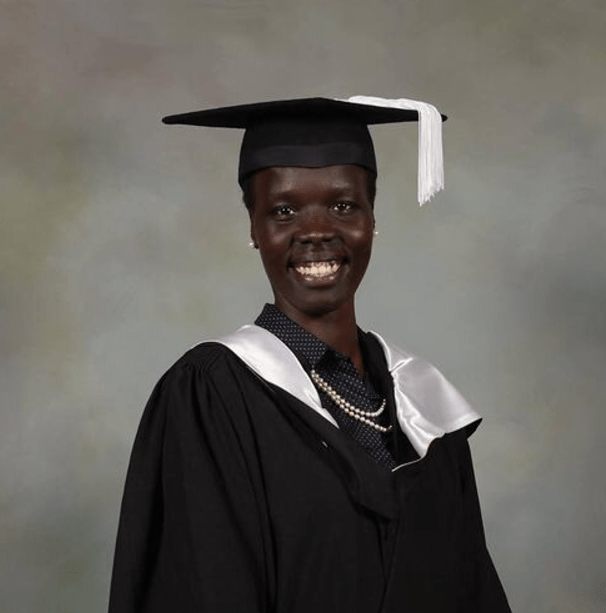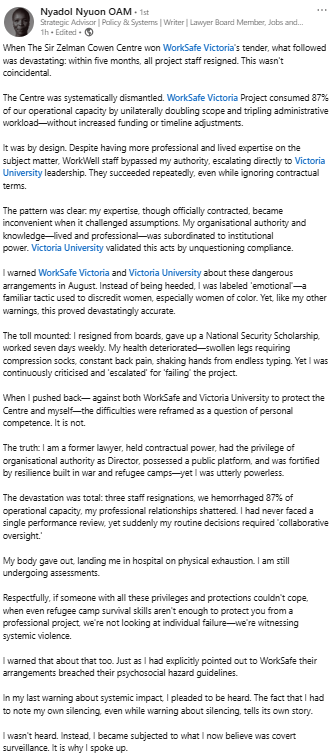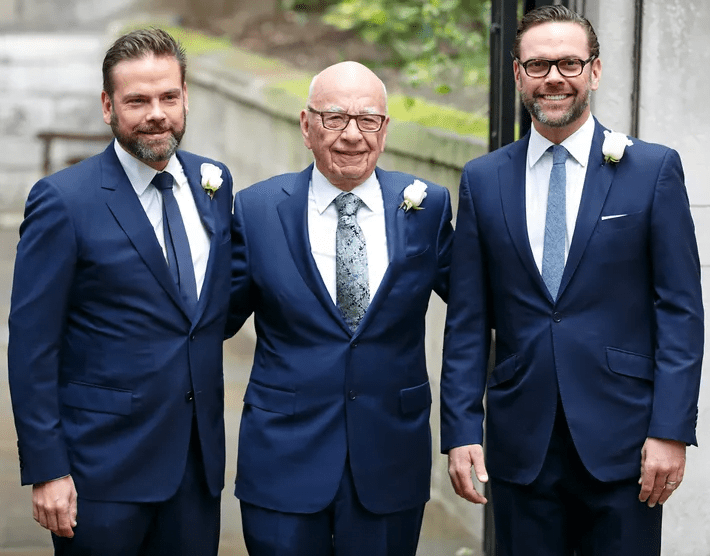Nyadol Nyuon, former Director of the Sir Zelman Cowen Centre at Victoria University, has revealed a troubling account of racism, professional sabotage, and personal suffering during her tenure at the institution
In a candid LinkedIn post on Monday, Nyuon revealed the devastating circumstances that led to her resignation and subsequent hospitalisation, shedding light on what she describes as systemic violence and discrimination.
Nyuon’s story reflects a broader pattern of racial discrimination at Victoria University, an institution that has faced scrutiny for its treatment of staff and students from diverse backgrounds. Despite ongoing diversity initiatives and the university’s public commitment to combating racism, Nyuon’s experience reveals deep institutional issues that continue to hinder genuine progress.

According to Nyuon, after the Centre won a major WorkSafe Victoria tender, the project quickly began to unravel. Within five months, all project staff had resigned, a scenario Nyuon insists was no accident.
She accused WorkSafe Victoria of systematically dismantling the Centre by tripling the administrative workload and doubling the scope of the project—without providing additional funding or extending the timeline.
“The Centre was systematically dismantled,” Nyuon wrote. “WorkSafe Victoria Project consumed 87% of our operational capacity by unilaterally doubling scope and tripling administrative workload—without increased funding or timeline adjustments. It was by design.”
Nyuon also highlighted how WorkWell staff repeatedly bypassed her authority and escalated matters directly to Victoria University leadership, undermining her professional expertise. Despite holding contractual power and having both lived and professional experience, Nyuon felt sidelined.
EXCLUSIVE: Lawyer Nyadol Nyuon Accuses Victoria University of Racism, Launches Legal Fight for Justice

“My expertise, though officially contracted, became inconvenient when it challenged assumptions,” she said. “My organisational authority and knowledge—lived and professional—was subordinated to institutional power. Victoria University validated this act by unquestioning compliance.”
She recalled how, in August, she warned both WorkSafe Victoria and Victoria University about the damaging effects of these arrangements.
“I warned WorkSafe Victoria and Victoria University about these dangerous arrangements in August,” she said. “Instead of being heeded, I was labeled ‘emotional’—a familiar tactic used to discredit women, especially women of color.”
Nyuon’s health began to deteriorate under the immense pressure. She was working seven days a week, resigning from boards, and giving up significant personal opportunities, including a National Security Scholarship. Her body could no longer keep up, leading to swollen legs, constant back pain, and shaking hands from endless typing. Yet, instead of receiving support, she was repeatedly criticised for “failing” the project.
“My body gave out, landing me in hospital on physical exhaustion,” Nyuon shared. “I am still undergoing assessments.”
Throughout the ordeal, Nyuon believes she was subjected to covert surveillance. She shared that even her personal and professional resilience, forged through war and refugee camps, couldn’t shield her from the institution’s power dynamics.
“The truth: I am a former lawyer, held contractual power, had the privilege of organisational authority as Director, possessed a public platform, and was fortified by resilience built in war and refugee camps—yet I was utterly powerless,” she said.

As her physical and emotional toll reached its peak, Nyuon stepped back, leaving her to reflect on the deeper systemic issues that led to her downfall.
“When I pushed back—against both WorkSafe and Victoria University to protect the Centre and myself—the difficulties were reframed as a question of personal competence. It is not,” she wrote.
She concluded by asserting that her experience was not an isolated failure but a reflection of broader institutional violence. “If someone with all these privileges and protections couldn’t cope, when even refugee camp survival skills aren’t enough to protect you from a professional project, we’re not looking at individual failure—we’re witnessing systemic violence,” she continued.
Nyuon’s story also calls attention to a broader history of racial issues at Victoria University. In 2020, the university was forced to acknowledge the deep impacts of systemic racism on its staff and students, particularly within Indigenous and refugee communities.
The university had launched a series of diversity and reconciliation initiatives, including the Bathelmun Yalingwa Strategy, but critics argue that such efforts have not translated into meaningful change for people of colour at the institution.
The alleged treatment of staff like Nyuon has raised questions about the effectiveness of these initiatives. Despite the university’s public commitment to diversity, Nyuon’s experience paints a picture of a system that continues to sideline and undermine the contributions of people of colour, particularly women, in leadership roles.
In the wake of her hospitalisation and continuing legal battle for justice, Nyuon launched a GoFundMe campaign to raise money for her legal fees. In just two days, the campaign raised more than $5,000, illustrating the strong support from those who believe in her cause.
“I appreciate the support of the black and brown women who came to me at the launch of the Work Well Respect Network,” Nyuon said. “I often thought of what I heard shared there. How many spoke of the many years of being unseen. I knew why this project could have mattered. I worked to the bone, hoping it would mean safer workplaces for our daughters—my daughter.”
Nyuon’s journey is far from over. As she fights for justice, her story has become a powerful symbol of the systemic barriers women of colour continue to face in professional settings. With the support of her community, Nyuon hopes to push for much-needed change, not just for herself, but for future generations of women of colour in leadership positions.
Back Cover News has contacted Victoria University for comment.

